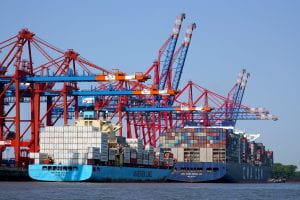 The UK and UKRI are leading the responsive manufacturing revolution with their recent funding call and Innovation Launchpad Network
The UK and UKRI are leading the responsive manufacturing revolution with their recent funding call and Innovation Launchpad Network
University of Bristol academics Dr Phil Davies and Dr James Gopsill have recently been awarded a grant for £100,000 for two research projects that will address this issue of supply chain resilience and the role of AI in creating improvements.
Integrating technologies within manufacturing
Gopsill and Davies were both successful with their BAM and ROMONA grants, respectively, that leveraged advanced technologies like additive manufacturing, blockchain, and AI. However, there’s a need to integrate these technologies more effectively within manufacturing settings to create scalable and resilient systems. The funding from the Innovation Launchpad Network will allow Gopsill and Davies to undertake this work in partnership with the Digital Catapult.
Vulnerabilities within supply chains
Research by Dr Phil Davies of the Business School will address vulnerabilities within manufacturing supply chains through the use of additive manufacturing to create responsive manufacturing systems.
In the wake of challenges such as Covid-19, Brexit and the climate crisis, Additive manufacturing has shown promise in stepping in where traditional supply chains falter, allowing for distributed manufacturing, on-demand production, and rapid development of parts.
Solving these vulnerabilities
The aim of this project is to use technology to secure design files and physical parts within the manufacturing system, analyse disruptions in real time, and reconfigure supply chain networks in response to these disruptions.
The program involves several work packages spanning continued research on supply chain resilience, industry collaboration and grant development.
Overall, the project aims to enhance the resilience of manufacturing supply chains through technological advancements and industry collaboration, aiming to translate academic research into practical and commercial solutions.
Research by Dr James Gopsill, School of Electrical, Electronic and Mechanical Engineering, will focus on revolutionising supply chains through AI-agent networks to address the challenges posed by a surge in demand across different stages of product lifecycles. This demand surge, termed “Big Demand,” is driven by global factors such as market fragility, customisation needs, supply chain uncertainty, sustainability goals, and circular economy principles.
Traditional supply chain methods are slow and involve negotiations over months or years with limited suppliers. In contrast, AI agents can negotiate across multiple suppliers in milliseconds, enabling a rapid response to Big Demand events.
The research will demonstrate the feasibility of AI-agent supply chain networks by creating physical and digital demonstrations. These demonstrations will be used in workshops, surveys, interviews, and interaction studies to understand adoption challenges, value propositions, and opportunities with the Digital Catapult’s Supply Chain membership.
The project involves six work packages spanning 15 months, focusing on creating exhibits, building an interactive AI-Agent Supply Chain Simulator and applying AI-agents to existing supply chain test beds.
Ultimately, the research aims to elevate this technology from its current level of readiness (TRL2/3) to higher levels (TRL4/5), paving the way for improvements to supply chain operations, including dissemination.
In addition to delivering their individual aims, the projects will further clarify the role of AI in monitoring and improving resilience in supply chains. The Researcher in Residences will work closely together combining Business and Engineering results to fully understand and start to overcome the socio-technical challenges of adopting responsive manufacturing. The understanding will provide the foundation for an ongoing programme of collaborative research between the teams, creating opportunities for further co-creation of research and the development of a joint research programme.
A triple win for researchers
Professor Ben Hicks, Theme Lead for the Innovation Launchpad Network, summarised the two successes as a triple win for the researchers, Network and Institution, and an exemplar use of the scheme for realising significant additionality.
Professor Johns (Interdisciplinary Lead for the Business School) described the awards as a significant boost and catalyst for the interdisciplinary collaboration at Bristol and within the Catapult.
James Gopsill said, “I am very excited to have received another Researcher-in-Residence that will enable me to pull-through novel supply chain brokering concepts into real-world application and work closely with Phil, the Digital Catapult and its Supply Hub. ”
Phil Davies “I am delighted to receive this Researcher-in-Residence award, not only to allow me to further develop my work on supply chain resilience alongside the Digital Catapult and their novel supply chain testbed capabilities, but to further strengthen my relationship with engineering for the delivery of impactful and important work.”
Find out more about research at the University of Bristol Business School.

